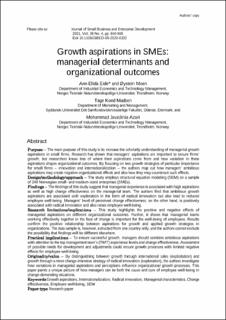| dc.contributor.author | Eide, Ann Elida | |
| dc.contributor.author | Moen, Øystein | |
| dc.contributor.author | Madsen, Tage Koed | |
| dc.contributor.author | Azari, Mohammad Javadinia | |
| dc.date.accessioned | 2021-11-09T09:30:57Z | |
| dc.date.available | 2021-11-09T09:30:57Z | |
| dc.date.created | 2021-05-01T20:06:28Z | |
| dc.date.issued | 2021 | |
| dc.identifier.citation | Journal of Small Business and Enterprise Development. 2021, 28 (4), 640-665. | en_US |
| dc.identifier.issn | 1462-6004 | |
| dc.identifier.uri | https://hdl.handle.net/11250/2828624 | |
| dc.description.abstract | Purpose
The main purpose of this study is to increase the scholarly understanding of managerial growth aspirations in small firms. Research has shown that managers' aspirations are important to ensure firms' growth, but researchers know less of where their aspirations come from and how variation in these aspirations shapes organizational outcomes. By focusing on two growth strategies of particular importance for small firms – innovation and internationalization – the authors map out how managers' ambitious aspirations may create negative organizational effects and also how they may counteract such effects.
Design/methodology/approach
The study employs structural equation modeling (SEM) on a sample of 249 Norwegian small- and medium-sized enterprises (SMEs).
Findings
The findings of this study suggest that managerial experience is associated with high aspirations as well as high change effectiveness on the managerial team. The authors find that ambitious growth aspirations are associated with exploration in the form of radical innovation but also lead to reduced employee well-being. Managers' level of perceived change effectiveness, on the other hand, is positively associated with radical innovation and also raises employee well-being.
Research limitations/implications
This study highlights the positive and negative effects of managerial aspirations on different organizational outcomes. Further, it shows that managerial teams working effectively together in the face of change is important for the well-being of employees. Results confirm the positive relationship between aspirations for growth and applied growth strategies in organizations. The data sample is, however, extracted from one country only, and the authors cannot exclude the possibility that findings will be different elsewhere.
Practical implications
To ensure successful growth, managers should combine ambitious aspirations with attention to the top management team's (TMT) experience levels and change effectiveness. Assessment of possible needs for development and adjustments could ensure growth processes with limited negative effects for employee well-being.
Originality/value
By distinguishing between growth through international sales (exploitation) and growth through a more change-intensive strategy of radical innovation (exploration), the authors investigate how variations in managerial aspirations and perceptions influence organizational growth processes. This paper paints a unique picture of how managers can be both the cause and cure of employee well-being in change-demanding situations. | en_US |
| dc.language.iso | eng | en_US |
| dc.publisher | Emerald | en_US |
| dc.title | Growth aspirations in SMEs: managerial determinants and organizational outcomes | en_US |
| dc.type | Peer reviewed | en_US |
| dc.type | Journal article | en_US |
| dc.description.version | acceptedVersion | en_US |
| dc.rights.holder | © Emerald. This AAM is provided for your own personal use only. It may not be used for resale, reprinting, systematic distribution, emailing, or for any other commercial purpose without the permission of the publisher | en_US |
| dc.source.pagenumber | 640-665 | en_US |
| dc.source.volume | 28 | en_US |
| dc.source.journal | Journal of Small Business and Enterprise Development | en_US |
| dc.source.issue | 4 | en_US |
| dc.identifier.doi | 10.1108/JSBED-09-2020-0332 | |
| dc.identifier.cristin | 1907614 | |
| cristin.ispublished | true | |
| cristin.fulltext | postprint | |
| cristin.qualitycode | 1 | |
